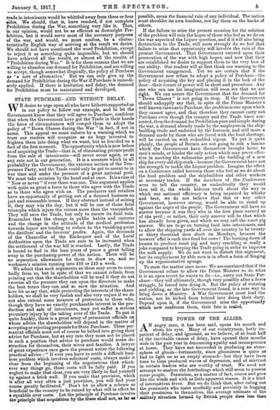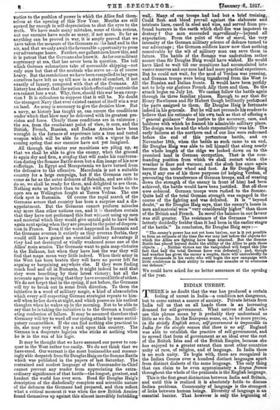THE POWER OF THE ALLIES.
ANangry man, it has been said, opens his mouth and shuts his eyes. Many of our countrymen, hotly im- patient of delay, and ignorant, as we believe, of at least half of the inevitable causes of delay, have opened their mouths wide in the past year in denouncing apathy and incompetence at home. They have not succeeded in producing an atmo- sphere of gloom—fortunately, since gloominess is quite as bad to fight on as an empty stomach—but they have from time to time produced waves of depression, and of mistrust in certain leaders who are worthy of trust. We need not attempt to analyse the forebodings which still seem to possess some people. Pessimism, as a matter of fact, comes and goes like the winds and with as little apparent reason. It is a kind of intermittent fever. But we do think that, after ruling out the pessimists who insist morbidly and peevishly in hugging their pessimism to themselves, the average estimate of the military situation formed by British people does lees than vustice to the position of power in which the Allies find them- selves at the opening of this New Year. Mouths are still opened far enough in self-depreciation to shut the eyes to the truth. We have made many mistakes, some of them serious, out our enemies have made as many, if not morn. So far as anything can be proved in war, it is amply proved that we have taken the measure of the Germans on zhe land and in the air, and that we only await the favourable apportunity to press our advantages home. Further, our gallant men know this, and it is patent that the Germans also know it. As for our militant supremacy at sea, that has never been in question.. The toll which German submarines take of mercantile shipping—not only ours but that of the neutrals who serve us—is of course heavy. But the restrictions we have been compelled to lay upon ourselves hare left us up till now in a state of comfort, if not exactly of luxury, compared with that of the Germans. All history has shown that the nation which effectually controls the sea cannot lose a war. Why, then, should this war be an excep- tion ? It is ridiculous to suppose that it will be. No doubt the strongest Navy that ever existed cannot of itself win a war on. land. An army is necessary to give the decisive blow. But a navy,, as history has taught us, can ensure the conditions under which that 'blow may-be delivered with its greatest pre- cision and force. Clearly those conditions are in existence ; the sea, from the combatant point of view, is ours, and the. British, French, Russian, and Italian Armies have been wrought in the furnace of experience into a true and tested weapon which will be able to strike with a vigour in the coming spring that our enemies have not yet imagined.
All through the winter our munitions are piling up, so that we shall be able to give the enemy, when the ground is again dry and firm, a strafing that will make his consterna- tion during the Somme Battle seem but a dim image of his new sufferings. In Egypt and Mesopotamia we have turned from the defensive to the offensive. Macedonia is not a suitable country for a large campaign, but if the Germans care to come as far as the outer defences of Salonika, and are able to do so, we shall be ready for them, and delighted to see them. Nothing suits us better than to fight with our backs to the open sea as Wellington fought at Torres Vedras. The one dark spot is Rumania. Of course the rapid march of the Germans across that country has been a surprise and a dis- appointment. But the Germans cannot perform miracles any more than other nations can, and it is therefore certain that they have not performed this feat without using up men and material which they would give untold gold to have back again next spring when they are pressed to the point of despera- tion in France. Even if the worst happened in Rumania and the Germans overran it entirely as they overran Serbia, they would still have gained no essential military advantage if they had not destroyed or vitally weakened some one of the Allies' main armies. The Germans want to gain map-victories in the Balkans, but when they have lost the war they will find that maps mean very little indeed. When their army in the West has been beaten they will have no power left for arguing or bargaining anywhere else. If they were finding much food and oil in Rumania, it might indeed be said that they were benefiting by their latest victory; but all the accounts agree in saying that they have secured little of either. We do not forget that in the spring, if not before, the Germans will try to break out in some fresh direction. To them the initiative is a word of military magic, a kind of abracadabra which every self-respecting German strategist repeats to him- self when he lies down at night, and which posses3es his earliest thoughts when he wakes up in the morning. Not to be able to say that he is taking the initiative is to the German a humili- ating confession of failure. It may be assumed therefore that Germany will try to ward off our spring attack by some antici- patory counterblow. If she can find nothing else practical to do, she may very well try a raid upon this. country. The German is a desperate logician who sticks at nothing when he is in the run of his logic.
It may be thought that we have assumed our power to con- quer in the West rather too easily. We do not think that we have erred. Our warrant is the most businesslike and reassur- ingly able despatch from Sir Douglas Haig on the Somme Battle which was published in the papers of last Saturday. The restrained and modest language of the Commander-in-Chief cannot prevent any reader from appreciating the extra- ordinary significance of that battle—the longest, greatest, and hardest the world has ever seen. Read Sir Douglas Haig's description of the diabolically complete and scientific nature of the defences the Germans had prepared, and then reflect what a critical moment it was when the new British Armies found themselves up against this almost incredibly forbidding wall.: Many, of one troops had had but a brief training. Could flesh and, blood prevail against the, elaborate and intricate lines,. cased in steel and wire, and served from pro- found burrows in the. earth which shell-fire was impotent to destroy ? Our men succeeded raarvellously—beyond all expectation. From the point of view of moral, the very intensity of the German military science of defence turned to our advantage ; the German soldiers know now that nothing conceivable by the wit of military man can save them in future. Tho battle of the Somme was undertaken rather sooner than Sir Douglas Haig would have wished. He would have liked to wait till our munitions had accumulated into vaster reserves and our men had had more practical experience. But he could not wait, for the need of Verdun was pressing, and German troops were being trred from the West to the Russian and Italian fronts. rtialuld have been perfidy not to help our glorious French Ally there and then. So the attack began on July 1st. We cannot follow the battle again through its three familiar phases. Enough to say that Sir Henry Rawlinson and Sir Hubert Gough brilliantly perfcCineci the parts assigned to them. Sir Douglas Haig is fortunate indeed in his generals. But he will not persuade his readers to believe that his estimate of his ovsn task as that of offering a " general guidance " does justice to the accuracy, care, and boldness with which he framed his admirable military plans. Tho design was his and the whole responsibility was his. The early failures at the northern end of our line were redeemed before the end of this portentous battle, and on November 18th, when the battle as such came to an end, Sir Douglas Haig was able to tell himself that along nearly the whole length of the ridge we looked down on to the promised land in German occupation. That is the com- manding position from which we shall restart when the weather is finer and warmer, and the plush has once again become firm under wheel and foot. As Sir Douglas Haig says, if any one of his three purposes (of helping Verdun, of preventing the transference of German troops, and of wearing down the strength of the enemy in front of him) had been achieved, the battle would have been justified. But di three were achieved. German troops were rushed to the Somme. Quite half of the total German strength was engaged in the course of the fighting and was defeated. It is " beyond doubt," as Sir Douglas Haig says, that the enemy's losses in men and material were " very considerably higher" than those of the British and French. In moral the balance in our favour was still greater. The resistance of the Germans " became latterly decidedly feebler than it had been in the earlier stages of the battle." In conclusion, Sir Douglas Haig says :- " The enemy's power has not yet been bro'mn, nor is it yet possible to form an estimate of the time the war may last before the objects for which the Allies are fighting have been attained. But the Somme Battle has placed beyond doubt the ability of the Allies to gain those objects. . . . Neither victors nor the vanquished will forget this [the fact that half the total German force was defeated] t and, though bad weather has given the enemy a respite, there will undoubtedly, be many thousands in his ranks who will begin the new campaign with little confidence in their ability to resist our assaults or to overcome our defence."
'We could have asked for no better assurance at the opening of the year.











































 Previous page
Previous page